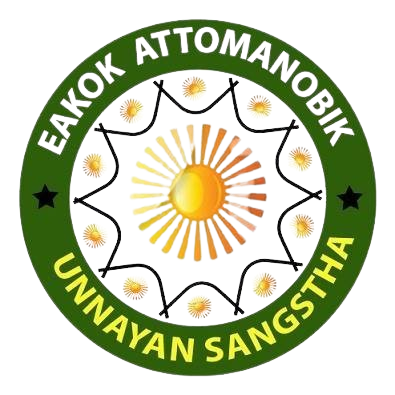
EAKOK ATTOMANOBIK UNNAYAN SANGSTHA
Sustainable Futures with EAKOK
SUSHIL PROJECT
Supporting the Unity and Sustainability of Civil Society Organization to Uphold Human Rights, National Integrity and Rule of Law in Bangladesh (SUSHIL) project, approved under ActionAid Bangladesh’s Poverty Alleviation through Sustainable Approach and its Administrative Cost Project by the NGO Affairs Bureau, is a four-year initiative co-financed by the European Union (EU).
- Co-financing Partner: European Union
- Project Duration: January 1, 2023 – December 31, 2026 (subject to donor funding continuation)
- Lead Applicant: ActionAid Bangladesh
- Co-applicant: Centre for Peace and Justice (BRAC University)
- Total Number of CSOs Involved: 123
- CSOs in Dhaka District: 15
- Working Areas: Nine districts – Naogaon, Bagerhat, Bandarban, Chattogram, Dhaka, Gaibandha, Kurigram, Kushtia, and Satkhira
Target Groups
- Women’s Rights CSOs (32 total): Including 25 women-led CSOs, the Violence Against Women Network, the Sex Workers’ Network, and the Acid Survivors’ Network.
- Social Cohesion, Peace, and Youth Empowerment CSOs (39 total): Comprising the Bangladesh Peacebuilder Network (1 national and 15 grassroots youth-led CSOs), 2 Women Peace Cafés, 7 Activista networks, 2 registered youth groups, and 12 school-based theatre groups.
- Minority Rights CSOs (5 total): All members of the Violence Against Women Network.
- Human Rights CSOs (47 total): Including 2 panel lawyer forums, 12 human rights lawyer forums, 15 human rights protection and security groups, 3 community-based human rights theatre groups, and 15 women’s associations for community-based human rights protection (with a total membership of 885).
Overall Objective
To strengthen CSOs as autonomous and independent actors of governance and development in Bangladesh.
Specific Objective / Expected Results
To build the capacity of local CSOs, alliances, networks, and multi-stakeholder platforms so that they can play a meaningful role in policy dialogue and hold service providers accountable for ensuring good governance and effective development outcomes.
Project Outputs
- Output 1.1: Establishing an enabling environment for CSOs and alliances to function effectively while enhancing transparency and accountability.
- Output 1.2: Creating opportunities for CSOs, alliances, and government stakeholders to engage in meaningful policy dialogue at multiple levels.
- Output 1.3: Strengthening organizational and technical capacity of CSOs in human rights, democracy, and good governance advocacy.
- Output 1.4: Enhancing collective action, coordination, and cooperation among CSO alliances.
Key Activities under FSTP (Financial Support to Third Parties)
- Organizing and building the capacity of CSOs.
- Establishing and managing CSO hubs.
- Holding quarterly coordination meetings at the hubs.
- Conducting roadshows.
- Facilitating CSO participation in national-level policy dialogues organized by ActionAid Bangladesh.
- Ensuring CSO engagement in parliamentary caucus dialogues on indigenous and minority affairs.
- Supporting public hearings and citizen manifestos with grassroots CSO participation.
- Promoting grassroots CSO representation in regional and international dialogues.
- Supporting voluntary local assessments to monitor progress on SDGs.
- Conducting research and evidence-based advocacy for inclusive services (with a focus on women, indigenous people, persons with disabilities, and youth) in partnership with BRAC University’s Centre for Peace and Justice.
- Identifying capacity gaps of CSOs and arranging training for organizational and technical development (by ActionAid Bangladesh).
- Connecting grassroots and district-level CSO networks through digital platforms/websites.
- Training CSOs on digital security and information safety.
- Organizing district-level civil society conferences and ensuring participation in national annual symposiums.
- Strengthening marginalized CSOs’ skills in donor engagement, technical advancement, and financial management.
- Building CSO–private sector partnerships for collaboration and resource mobilization.
Key Stakeholders
- Grassroots CSOs and Networks: Women-led, youth-led, indigenous rights, and human rights CSOs.
- Media Organizations and Outlets: Platforms for amplifying civic engagement and public dialogue.
- CSO Alliances and Hubs: Key intermediaries linking grassroots CSOs to national-level platforms and policy processes.
- Government Authorities and Ministries: Including Ministry of Social Welfare, Parliamentary Caucus, NGO Affairs Bureau, National Human Rights Commission, Ministry of Home Affairs, and Ministry of Information and Broadcasting — all engaged in evidence-based advocacy and policy recommendations.
List of CSOs in Dhaka District
- Abhiyan
- Agni Foundation Bangladesh
- Apon Foundation
- Amal Foundation
- Women’s Windows
- NDBAS
- Sex Workers’ Network
- Harmony Trust
- Eakok Attomanobik Unnayan Sangstha
- Action for Social Development (ASD)
- Association for Social Development of Bangladesh (ASDB)
- Dhrubotara Youth Development Foundation (DYDF)
- Council of Minorities
- No Passport Voice (NPV)
15. Society for Action and Development Alternative (SADA)